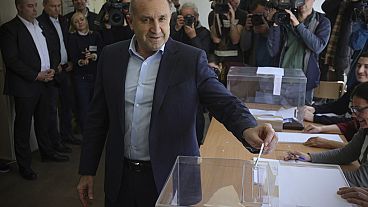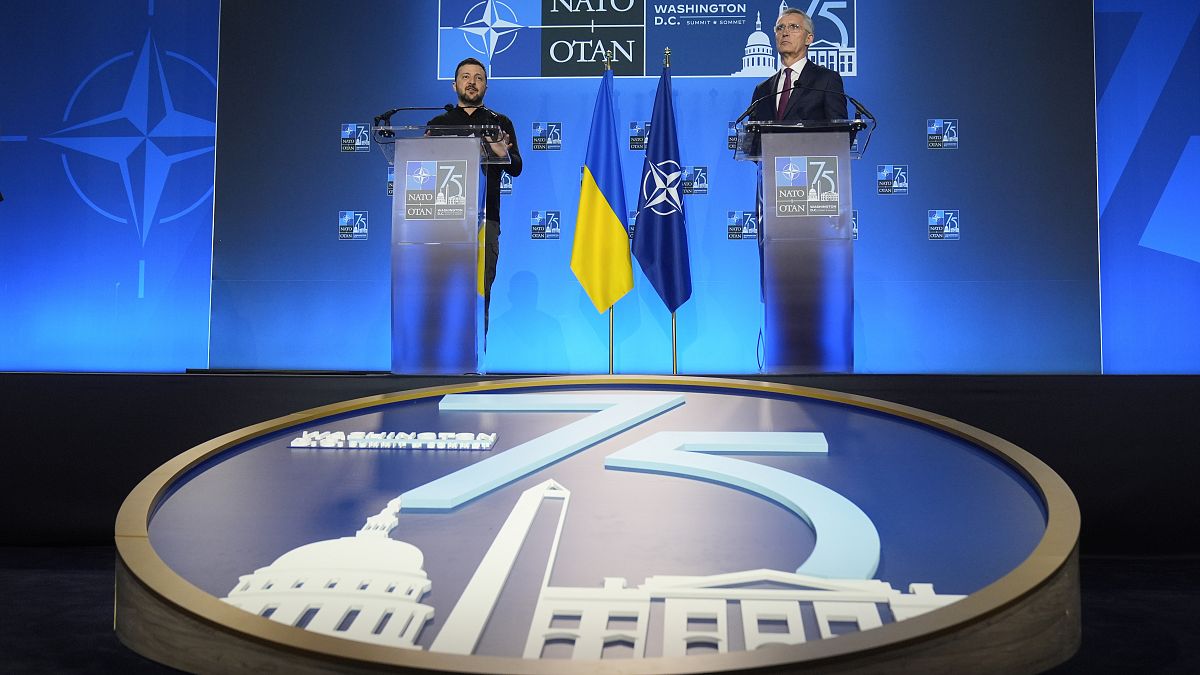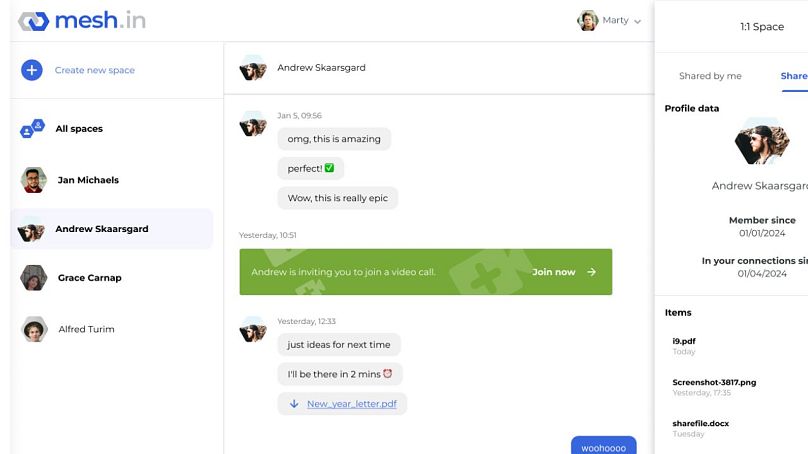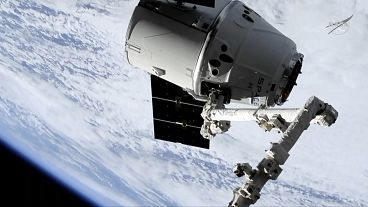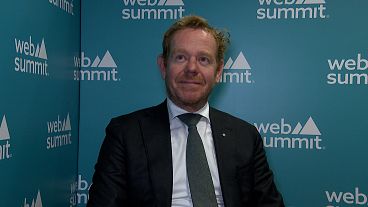As the global alliance met to discuss how to deal with growing security threats, Euronews Next spoke to some of the start-ups NATO is working with.
Marking its 75th anniversary at a summit in Washington DC this week, the North Atlantic Treaty Organization (NATO) put Ukraine firmly in the spotlight. But new technologies and start-ups will underpin its ambitions to adapt to meet today’s security threats.
NATO stated in its Washington Summit Declaration that it has accelerated its transformation to meet current and future threats and maintain its technological edge, which it would do through experimentation and the rapid adoption of emerging technologies.
Technologies such as artificial intelligence (AI), biotech and quantum are evolving and innovating at an extraordinarily rapid pace and NATO says it is aiming to harness these types of innovations.
“What we've long recognised is that one of the foundations of our abilities is to deter and to defend our technological edge,” Phil Lockwood, Head of NATO’s innovation unit, told Euronews Next before the Washington summit.
However, he said that while we might be in a time of technological innovation that we've never had in terms of pace before, “we are in a position where that technological edge that we've relied on is potentially eroding”.
“We have to do a lot of work to continue to maintain this edge because there are adversaries and competitors are actively pursuing their own technological edge,” he added.
One of the technologies that NATO is looking into is sea bed mapping. The Dutch start-up Lobster Robotics is one that the defence organisation has invested in.
“If they had survey equipment, they could have found or seen the Nord Stream pipeline explosions. I don't know if it would be inclined to do anything about it, but at least you would have known that it was going to happen,” Stephan Rutten, co-founder and CEO of Lobster Robotics, told Euronews Next.
Lobster Robotics is one of the 44 companies selected out of 1,300 that applied to NATO's start-up fund programme, known as the Defence Innovation Accelerator for the North Atlantic, or DIANA.
Its mission is to find dual-use innovations and provide the developers with resources, worth several hundreds of thousands of euros, and a network they need to address critical defence and security challenges.
Dual use is one of the criteria for DIANA which means that a start-up can be used for commercial and societal use as well as for defence. NATO also has a bigger fund, the NATO Innovation Fund, at its disposal to boost start-ups.
Lobster Robotics’s optical sea bed mapping technology can zoom in to see what is on the sea floor, even spotting the tracks of a crab or starfish on the seabed.
It drastically reduces the cost of using teams of divers and is much safer. But it can also be used in defence, especially for mapping critical underwater infrastructure, such as wind farms or oil rigs, where security is lacking.
Disrupting the procurement process
But access to governments or defence ministries is lucrative and it is difficult for a start-up to get a foot in the door.
“It comes down to network[ing]. You need to know the people. You need to know how the organisation works,” said Rutten, adding that the NATO “stamp of approval” helped the company work with governments.
“I urge governments to really think on the time scale of start-ups. They say they are going very fast. And then I hear procurement will only take another 18 months… I could have started five new companies by then,” he added.
The Greece-based company Sortiria Technology is another underwater intelligence firm selected by NATO that has also found the procurement period especially long.
It is a deep-tech start-up that is developing AI sensing technology for the defence industry.
“There are long contraction cycles and the buying process is a concentrated process and it is also different in every country,” said Angelos Tsereklas, the managing director of Sortiria Technology.
“But we see a lot of disruption in that model, with initiatives such as DIANA or the NATO Innovation Fund. But also from the European Union and the European Investment Bank, who are supporting dual-use applications,” he told Euronews Next.
“We see this painting and we see an effort for a consolidated approach in the European Union and in the NATO countries,” he added.
This month, NATO launched a call for a second round of the DIANA project, focused on areas including energy, human health, information security, logistics, and critical infrastructure.
Information security, or cybersecurity, is one of the chief concerns for NATO and many lessons can be learned from Ukraine, which saw an onslaught of sophisticated cyber attacks from Russia.
Cyber wars
In its Washington Summit Declaration, the global defence alliance warned of cyber threats from Russia and China and said that the countries could even work together in a strategic partnership.
NATO also announced at the summit a new cyber alliance of its own, which will be called the Integrated Cyber Defence Centre. The centre will bring together civilian and military personnel from across the NATO Enterprise, allied countries, and industry experts.
One start-up that has caught the attention of NATO is Hushmesh, which is creating a safer and more efficient Internet that it calls “the new web”.
While this may take a decade or two before it takes off, the CEO of the company Manu Fontaine said that “the natural, glide path is to actually start developing services on an infrastructure that is inherently secure, inherently verified”.
Until then, the US-based company is developing a messaging service it hopes NATO allies can use as a part of a pilot in 2025.
“We cannot see what the infrastructure is doing,” Fontaine told Euronews Next.
“We do not have access to the messages that are flowing through it. The data is truly encrypted with keys that no humans have access to”.
The Washington Summit Declaration also stated that NATO wants to closely monitor the technological advancements on the battlefield in Ukraine, including through experimentation and more rapid adoption of emerging technologies.
For Lobster Robotics’s CEO, while government procurement is a “nightmare,” things are changing slowly.
“A lot of countries are changing now to be more agile and to open their arms to innovation faster, basically because they see how well it works in Ukraine,” Rutten said.
“They make new stuff every day and it keeps getting better. But it will take a few more years I think before we really see that into action”.


